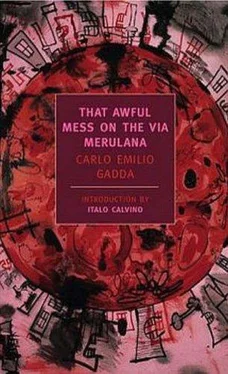She dried herself with her hand, sobbed, changed her mind: "Well, what do you think? He's not the only fish in the sea." And she started, at a new sob, to look for a handkerchief: to dry her face, her nose: until, as usual, she rubbed it on her sleeve. Poor creature! The elbow revealed the hole, and the sleeve the darns and the tatters. The poor wrist, the arm, the shoulders jerked in desperate sobs. But she raised her head: and with her wet face she looked at them again. "When he finds a woman that'll come across, I mean one of those women. . who don't make any fuss about it, because that's what they're out looking for, then he makes her go to a fancy place: to Bottaro in Passeggiata di Ripetta: or to the Quattro Cantoni to L'Aliciaro, behind San Carlo: or maybe in Via della Vite, if he catches on. . that she's from out of town, that she's maybe a foreigner, something special: and he has a sharp eye for them. Even to the Buco in Sant' Ignazio, sometimes, where they're Tuscans, he told me: from Tuscany. And there, you have to drink their wine, and it costs more because it's famous and fancy and all."
"I understand," murmured Fumi, his great head on the desk.
"Tuscans!" she resumed: and throwing her head back, with one hand she thrust back her hair, those blond locks on which drops of glue had rained: then she whispered, bored: "they're a bunch of stinkers, too, goddamn 'em." The imprecation was lost in a murmur, in the apocope of the pronoun, in an ever less benevolent stammering of the tongue, of the lips.
"Stinkers? What have they ever done to you?" Grabber pricked her again, with a tinkling laugh, as a novelist would say; but which, given his gullet, was instead the thunder of a trombone.
"Nothing. They didn't do nothing to me. I just happen to know they're stinkers, that's all."
"Take it easy, Pompeo, and don't bother her," Doctor Fumi said, contracting his nose: and to the girl: "You were saying i
"I was saying that, with women like that, he picks them up right off, without having to work too hard to make them catch on. T beg your pardong, could you direck me to Villa Porghesay?' When they're on Via Veneto, a foot away. Or even at the arches of Porta Pinciana! the pigs. 'It's not far away from here.' I'll say it isn't. All you have to do is cross the street. He lights her cigarette maybe. T can show you the way, if you want!' And they want, all right. With me, it's different, with these rags I have on. . dying of the cold. With me, now, he doesn't even want to come: he says I'm stupid, that I look like a beggar. But with them! From Porta Pinciana, to the lake, to the Belvedere — it isn't a walk that makes your feet hurt, either. A little chat, as they go, turning to look at each other every now and then, looking her straight in the eye. Oh I know, I know how he does." "And what about you?"
"Me? They've screwed me, that's what they've done, so's I don't know which way to turn for a crust of bread: I'm just about ready to jump in the river. With them, they have a nice hot meal, a dinner — or supper, anyway."
"And the ready?"
"The ready?"
"The money, I mean: who puts out?" Pompeo interrupted again, rubbing his thumb against his index finger in the classic gesture.
"Shut up, Pompeo, you're getting on my nerves," Fumi admonished him. Then, to her: "These dinners, or let's say these suppers: who pays for them?"
"He pays, of course," the girl replied with hauteur and envy: "but she passes him the cash under the napkin: or when they go into Bottaro's" (envy of the disbursing rival) "while they're looking in the window… at the list of the day's dishes. To see if there's chicken, or lamb. They've worked it all out along the way: and he's got a driver's license and everything, he took the exam, and all he has to do is collect the license in Via Panisperna, but he needs certain papers still, certain official stamps: and he knows all the restaurants in Rome by heart, but it wouldn't look good for him or for her either, to let them see that she's the one who's putting out the money. Rome isn't like Paris, he says. Because we've got the Pope here." They laughed. In her weariness, in her tears, erect, at the end, in the mucid light of the room, she had spoken, resplendent: her lashes, blond, turned aloft, radiated above the luminous gravity of her gaze: her tears had cleansed the irises, a dark brown, the two turquoise jewels they enclosed. Her face appeared stained and tired.
"And he made his aunt, too, if she is his aunt, give him a hundred lire. One time when he was in a hurry to go someplace, I forget where. And I have a feeling she never saw it again, that hundred note. Her husband's a scar-face; she says he used to be a baker, but he never comes home."
Zamira had had a fight with him: "Maybe because he talked me into coming away: and she was furious. You'll regret this, she said to me: the old witch! Listen to me! you'll be sorry, baby! With those dragon eyes of her's! He made me touch a coral horn {49}: and he touched it, too. Yes, he was the one who talked me into it. So they had a fight. Maybe that was the reason, or maybe — who knows — because there was no more money in it for them. She's an old witch, a lousy hick whore. Even in Africa, she went whoring. Fifteen years ago. And when it comes to money, she'd skin her own father alive. He took me away."
"And that's why they fought?" asked Fumi, not convinced. The girl didn't hear the question. "You can understand how he looked at it, too. A boy like him! For nothing. . too little! He told her to find herself somebody else. He said he wasn't working just for the fun of it. You women, he says, don't have to do anything, just have a little patience. You just have to be still for a couple of minutes. A couple of sighs. And in the meanwhile. . domino vobisco … so long. . till next time! But us men, he says! and he swells his chest: with us, it's a different thing, altogether!"
"Did you hear that?" said Doctor Fumi, deeply depressed, as one who hears or sees torpedoed or mocked, by unforeseen jest or torpedo, the most sainted, the most deeply rooted belief in the goodness of human nature. He turned his great eyes around sadly, as if to ask aid of the gentlemen co-inquisitors. His neck was stuffed into his shoulders: as if an apostle of ill humor had pressed a heel on his head. The cynical boldness of those remarks of the young man, reported by Ines, seemed to put a full stop to her tale.
They were about to dismiss her, and Paolillo was already moving, an uncoercible yawn having engaged his jaws, which for over an hour had been longing for another occupation: when, tears dried, she threw out another few words, as a supplement to what had already been said: with a calm, ringing voice, like the reprise of an aria which she had previously paid out towards the bliss of the listeners: "He has a little brother, too, named Ascanio: he must have hung around the same building, where that countess from Venice lives. A cute little kid: smart as anything! always scared, though, like he was afraid he wouldn't get away with something. He looks up at you, and then shuts his eyes: he reminds me of a cat when it wants to tell you it's sleepy, when instead it's done something dirtier than usual, and knows it, but doesn't want you to know. A quick kid, like his brother: but a different kind: something between an altar boy and a delivery boy from that baker's there."
"And this would be the younger brother, the little one, Ascanio Lanciani," Fumi said, pensive, inviting, forcing his whole tongue into the cia of Lanciani, exceptionally. But the cats were all out of the bag, now.
"Yes, Ascanio," she spilled on, nevertheless, "Ascanio."
Ingravallo had a start, which he contained, a growl of his soul: like a dozing mastiff in his professional suspicion, which rewakens, at night, the muffled and cautious footstep of the Probable, the Improbable. "A kid who worked in a shop, at a grocer's. . Moving here and there, like his brother. Then I think he traveled around, from town to town, with a peddler. I saw him just last Sunday, the thirteenth of the month, he was with his granny, selling roast pork. ."
Читать дальше












